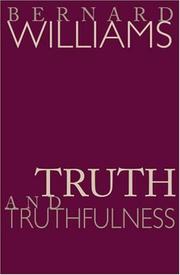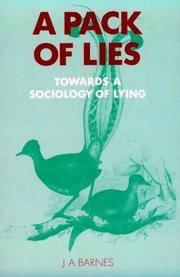| Listing 1 - 3 of 3 |
Sort by
|
Book
ISBN: 9781107447745 9781107061095 9781107685680 1107061091 1107685680 1139862561 1139699490 1107447747 1139871277 1139863428 1139865552 1139861263 1139869159 9781139865555 9781139871273 9781139699495 9781139862561 9781139861267 9781139863421 9781139869157 Year: 2014 Publisher: Cambridge : Cambridge University Press,
Abstract | Keywords | Export | Availability | Bookmark
 Loading...
Loading...Choose an application
- Reference Manager
- EndNote
- RefWorks (Direct export to RefWorks)
This book defends the controversial 'absolute view' of lying, which maintains that an assertion contrary to the speaker's mind is always wrong, regardless of the speaker's intentions. Whereas most people believe that a lie told for a good cause, such as protecting Jews from discovery by Nazis, is morally acceptable, Christopher Tollefsen argues that Christians should support the absolute view. He looks back to the writings of Augustine and Aquinas to illustrate that lying violates the basic human goods of integrity and sociality and severely compromises the values of religion and truth. He critiques the comparatively permissive views espoused by Cassian, Bonhoeffer, and Niebuhr and argues that lies often jeopardize the good causes for which they are told. Beyond framing a moral absolute against lying, this book explores the questions of to whom we owe the truth and when, and what steps we may take when we should not give it.
Truthfulness and falsehood --- Christian ethics --- 241.66 --- 241.66 Theologische ethiek: waarheid en leugen --- Theologische ethiek: waarheid en leugen --- Believability --- Credibility --- Falsehood --- Lying --- Post-truth --- Untruthfulness --- Reliability --- Truth --- Honesty --- Ethical theology --- Moral theology --- Theology, Ethical --- Theology, Moral --- Christian life --- Christian philosophy --- Religious ethics --- Religious aspects&delete& --- Christianity --- Religious aspects --- Christian ethics. --- Truthfulness and falsehood. --- Christianity.

ISBN: 0691102767 0691117918 9780691117911 9780691102764 Year: 2004 Publisher: Princeton Princeton university press
Abstract | Keywords | Export | Availability | Bookmark
 Loading...
Loading...Choose an application
- Reference Manager
- EndNote
- RefWorks (Direct export to RefWorks)
What does it mean to be truthful? What role does truth play in our lives? What do we lose if we reject truthfulness? No philosopher is better suited to answer these questions than Bernard Williams. Writing with his characteristic combination of passion and elegant simplicity, he explores the value of truth and finds it to be both less and more than we might imagine. Modern culture exhibits two attitudes toward truth: suspicion of being deceived (no one wants to be fooled) and skepticism that objective truth exists at all (no one wants to be naive). This tension between a demand for truthfulness and the doubt that there is any truth to be found is not an abstract paradox. It has political consequences and signals a danger that our intellectual activities, particularly in the humanities, may tear themselves to pieces. Williams's approach, in the tradition of Nietzsche's genealogy, blends philosophy, history, and a fictional account of how the human concern with truth might have arisen. Without denying that we should worry about the contingency of much that we take for granted, he defends truth as an intellectual objective and a cultural value. He identifies two basic virtues of truth, Accuracy and Sincerity, the first of which aims at finding out the truth and the second at telling it. He describes different psychological and social forms that these virtues have taken and asks what ideas can make best sense of them today. Truth and Truthfulness presents a powerful challenge to the fashionable belief that truth has no value, but equally to the traditional faith that its value guarantees itself. Bernard Williams shows us that when we lose a sense of the value of truth, we lose a lot both politically and personally, and may well lose everything.
Credibilite --- Credibility --- Falsehood --- Geloofwaardigheid --- Insincerite --- Leugen --- Lying --- Mensonge --- Onoprechtheid --- Truth --- Truthfulness and falsehood --- Untruthfulness --- Vérité --- Vérité et mensonge --- Waarheid --- Waarheid en leugen --- Believability --- Truth. --- Truthfulness and falsehood. --- Reliability --- Honesty --- Conviction --- Belief and doubt --- Philosophy --- Skepticism --- Certainty --- Necessity (Philosophy) --- Pragmatism --- Post-truth --- #A0212W --- Philosophical anthropology --- Theory of knowledge --- genealogie --- kennisleer

ISBN: 0521459788 0521453763 9780521459785 0511520980 9780511520983 9780521453769 Year: 1994 Volume: *7 Publisher: Cambridge Cambridge University Press
Abstract | Keywords | Export | Availability | Bookmark
 Loading...
Loading...Choose an application
- Reference Manager
- EndNote
- RefWorks (Direct export to RefWorks)
Defining lies as statements that are intended to deceive, this book considers the contexts in which people tell lies, how they are detected and sometimes exposed, and the consequences for the liars themselves, their dupes, and the wider society. The author provides examples from a number of cultures with distinctive religious and ethical traditions, and delineates domains where lying is the norm, domains that are ambiguous and the one domain (science) that requires truthtelling. He refers to experimental studies on children that show how, at an early age, they acquire the capactiy to lie and learn when it is appropriate to do so. He reviews how lying has been evaluated by moralists, examines why we do not regard novels as lies and relates the human capacity to lie to deceit among other animal species. He concludes that although there are, in all societies, good pragmatic reasons for not lying all the time, there are also strong reasons for lying some of the time.
Bedriegerij --- Bedrog --- Chicanery --- Credibilite --- Credibility --- Deceit --- Deception --- Falsehood --- Geloofwaardigheid --- Insincerite --- Leugen --- Listen --- Lying --- Mensonge --- Misleiding --- Onoprechtheid --- Ruses --- Subterfuge --- Tromperie --- Truthfulness and falsehood --- Untruthfulness --- Vérité et mensonge --- Waarheid en leugen --- Deception. --- Truthfulness and falsehood. --- 800:159 --- #SBIB:309H517 --- Psycholinguistiek. Neurolinguistiek --- Verbale communicatie: sociale psychologie van de taal en de interactie, psycholinguistiek --- 800:159 Psycholinguistiek. Neurolinguistiek --- Believability --- Reliability --- Truth --- Honesty --- Intrigue --- Social aspects --- Post-truth --- Social Sciences --- Sociology
| Listing 1 - 3 of 3 |
Sort by
|

 Search
Search Feedback
Feedback About UniCat
About UniCat  Help
Help News
News